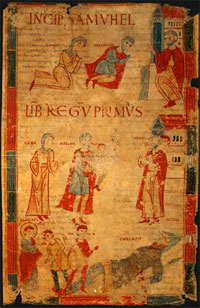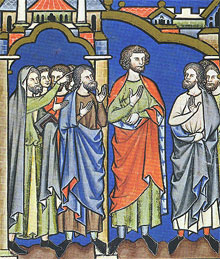From Our Archives
Debie Thomas, The Sleeping Gardener (2021); Debie Thomas, Meanwhile, The Kingdom (2018); and Dan Clendenin, Point of View (2015).
For Sunday June 16, 2024
Lectionary Readings (Revised Common Lectionary, Year B)
Psalm 20 or Psalm 92:1-4
2 Corinthians 5:6-17
Mark 4:26-34
This Week's Essay
1 Samuel 15:34, "The Lord was grieved that he had made Saul king over Israel."
The American presidential election is only five months away, and I find myself increasingly discouraged. As my wife will tell you, I find it hard to watch the evening news. It would be nice if the United States could solve its problems by just switching presidents or parties, but our problems run far deeper than binary ideologies. There are many, complicated reasons why the approval ratings of all three branches of our government are at historic lows.
So, I was surprised this week with an odd sort of comfort in 1 Samuel 15:34, that "the Lord was grieved that he had made Saul king over Israel." This is an ancient story about Israel's transition of political power from Saul to David. It was necessitated by political chaos. And beyond the tragedy of Saul, there's a warning for us today about realistic political expectations.
To backtrack a bit: 1 Samuel 8 describes Israel's transition from a loose federation of tribes to its first centralized power under Saul. The people demanded the political status quo: "We want a king like the other nations.” Samuel objected to their desire to mimic the pagan nations, he went to God in prayer, but was ultimately rebuffed by the people: "No! We want a king over us. Then we will be like all the other nations." Samuel granted their request, but warned them of the harsh consequences to follow — the government would conscript their children for wars, make them domestic slaves, confiscate their land, and levy exorbitant taxes.
 |
|
Four Scenes from the First Book of Samuel, late 11th century, miniature on vellum.
|
The newly anointed Saul did all this and more. He was a war president: "All the days of Saul there was bitter war with the Philistines." He was also a war profiteer. After defeating the Amalekites, he took for himself "the best of the sheep and cattle, the fat calves and lambs — everything that was good," all under the pretext of religious piety (1 Samuel 14:52, 15:9). Saul also "set up a monument in his own honor" (15:12). Commentators describe him as raving mad.
Saul's life and reign ended in tragedy. He tried to murder his successor David (who spared his life twice). After God rejected his prayers, he consulted a medium. He died by suicide, after which the victorious Philistines recovered his body, along with those of his three sons who also died in the battle, decapitated them, and then fastened his body to the wall in the public square of Beth-Shan. Later still, the enemy Gibeonites executed Saul's two surviving sons and five of his grandsons, then displayed their bodies in the sanctuary at Gibeah. For five months their bodies were exposed to the elements, while, if you can even imagine it, their grief-stricken mother Rizpah, Saul's concubine, guarded the dead bodies of her children from being devoured by wild animals.
It's no wonder, then, that "the Lord was grieved that he had made Saul king over Israel."
Saul's successors continued this bleak narrative. The political panorama of 1–2 Kings describes the reigns of forty kings and one queen (Athaliah in 2 Kings 11) in the 400 hundred years from the death of David to Israel's exile to Babylon in 586 BC. Only two kings received unqualified approval by the narrator (Hezekiah in 2 Kings 18:3 and Josiah in 22:2). With monotonous regularity, over thirty times, he renders the ominous judgment that a king "did evil in the eyes of the Lord."
Instead of the glorification or celebration of political power, instead of the fulfillment of legitimate expectations, this history of politics from Saul's anointing in 1 Samuel 8 to Israel's exile to Babylon is unremittingly pessimistic. The status quo of dysfunctional politics held firm, and ordinary people paid the price.
In his commentary on 1–2 Kings called The Kings and Their Gods; The Pathology of Power (2008), Daniel Berrigan (1921–1916) reads these savage stories as self-serving imperial records that portray Israel's kings as they saw themselves and wanted others to see them — God is for us and against our enemies. He blesses us with their treasure. No war crime is too heinous as a means to these delusional ends. And so on page after page political hell comes to earth.
There is a deeply powerful dictum that remains the same throughout the centuries, says Berrigan: extra imperium nulla salus, "outside the empire there is no salvation." There are many pathological means to this perverse end: untrammeled imperial ego, political power with absolute impunity, military might, revisionist history, manipulation of memory and time, grandiose building projects, economic exploitation, virulent nationalism, and, sanctioning it all with divine approval, religious legitimation.
 |
|
Samuel anoints Saul as King, Maciejowski Bible (13th century illuminated manuscript).
|
In 1–2 Kings, says Berrigan, the Bible is thus "deconstructing" itself; "the medium itself is the message." A few dissenting voices object to imperial power, but they are silenced as unpatriotic and seditious. Only with the eighth-century prophets like Amos are these "official" texts amended so that we see and hear the real perspective of Yahweh about justice, kindness, and humility for all people everywhere (Micah 6:8).
Does this ancient story of a dysfunctional political status quo not sound tragically modern? Israel's political history that began with the tragedy of Saul functions like a mirror in which we see our own reflection today. "Do our leaders differ, in any large degree, from the rulers of old? They are hardly different at all."
Berrigan was many things to many people — Jesuit priest, poet (15 volumes), playwright, author of over fifty books, university professor, and peace activist. He spent a long life celebrating the good news of Jesus rather than the bad news of caesar. Most of all, like Elijah of old, he was a troubler of the modern conscience. Berrigan was best known for his civil disobedience against government policies on a broad range of issues — racism (he marched in Selma), nuclear arms (he founded the Plowshares Movement), the death penalty, and most famously Vietnam (partnering with the likes of Howard Zinn and Thomas Merton). He was also a pro-life activist who lamented what he called "the abortion mills."
But Berrigan was also a brutal realist. In her memoir Things Seen and Unseen, Nora Gallagher recalls meeting Berrigan in the spring of 1986. When she asked how many times he had been jailed for his life of political protests, he responded, "Apparently, not enough." This was a wry admission by Berrigan about his own sense of futility and failure.
Similarly, in his New York Times obituary, Daniel Lewis wrote about Berrigan's deep discouragements. Lewis writes, "While he was known for his wry wit, there was a darkness in much of what Father Berrigan wrote and said, the burden of which was that one had to keep trying to do the right thing regardless of the near certainty that it would make no difference. In the withering of the pacifist movement and the country’s general support for the fighting in Iraq and Afghanistan, he saw proof that it was folly to expect lasting results."
“This is the worst time of my long life,” he said in an interview with The Nation in 2008. “I have never had such meager expectations of the system.”
I think this was Berrigan's penultimate word rather than his final word. He never gave up, nor should we. For his 80th birthday he remarked, “The day after I’m embalmed, that’s when I’ll give it up.” What made it bearable, he wrote elsewhere, was "a disciplined, implicitly difficult belief in God as the key to sanity and survival."
 |
|
Samuel Anoints David, Dura Europas, Syria 3rd century CE.
|
In his book No Gods But One (2009), a chapter-and-verse study of Deuteronomy, Berrigan wrote: "Nor is the fall the final judgment, as though we were bereft of all hope. No, there has occurred an intervention of God, for healing and reconciliation. An intervention named Jesus." At the end of that book he calls us to live "as though the truth were true."
Similarly, in The Kings and Their Gods, he challenges us with a last word on his final page. "One must urge (to his own soul first) a firm rebutting midrash; bring Christ to bear. Read the gospel closely, obediently. Welcome no enticements, no other claim on conscience. Mourn the preachers and priests whose silence and collusion signal plain revolt against the gospel. Enter the maelstrom, the wilderness; flee the claim that would possess your soul. Earn the blessing; pay up. Blessed — and lonely and powerless and intent on the Master — and, if must be, despised, scorned, locked up — blessed are the makers of peace."
For further reflection
In The Lord of the Rings, the elves of Lothlorien admit that they are losing their forest lands. But they battle on, characterizing their struggle as “fighting the long defeat.” In Letters of Tolkien, Tolkien describes our human struggle in identical language: "Actually, I am a Christian, and indeed a Roman Catholic, so that I do not expect 'history' to be anything but a 'long defeat' — though it contains (and in a legend may contain more clearly and movingly) some samples or glimpses of final victory."
Weekly Prayer
James Russell Lowell (1819–1891)
A portion from The Present Crisis (1845)
Careless seems the great Avenger; history's pages but record
One death-grapple in the darkness 'twixt old systems and the Word;
Truth forever on the scaffold, Wrong forever on the throne,—
Yet that scaffold sways the future, and, behind the dim unknown,
Standeth God within the shadow, keeping watch above his own.
Dan Clendenin: dan@journeywithjesus.net
Image credits: (1) National Gallery of Art; (2) www.medievaltymes.com; and (3) Wikipedia.org.





